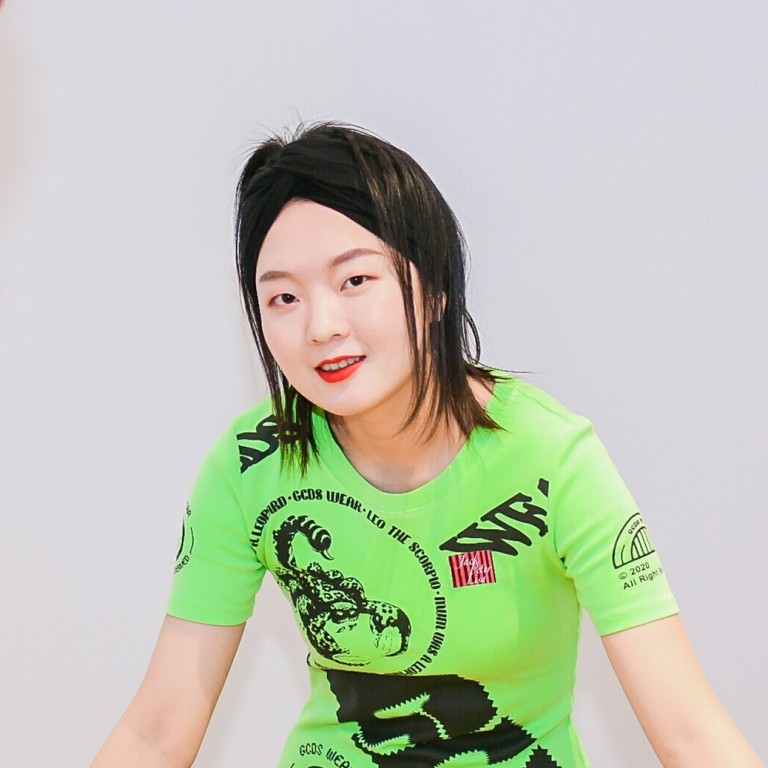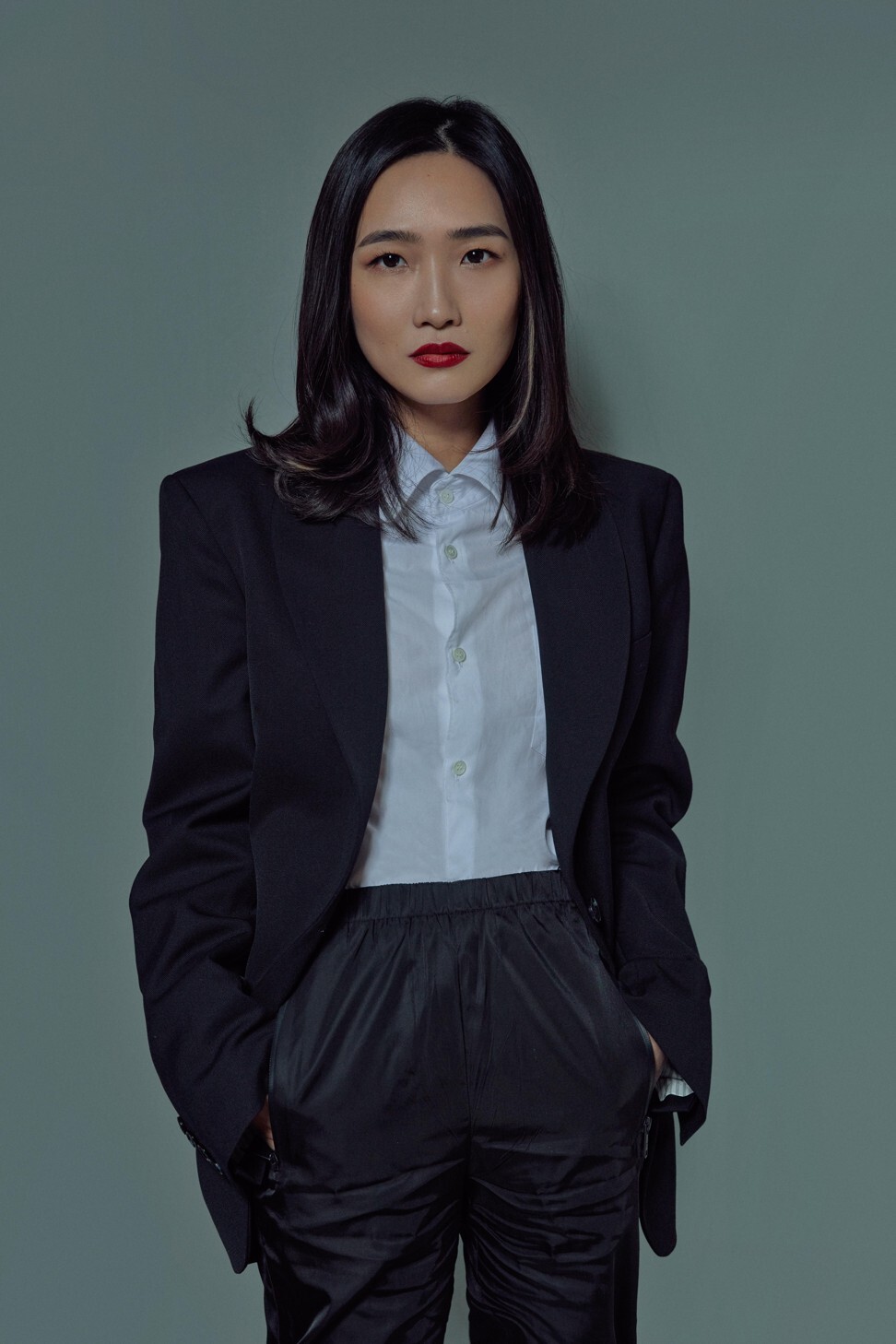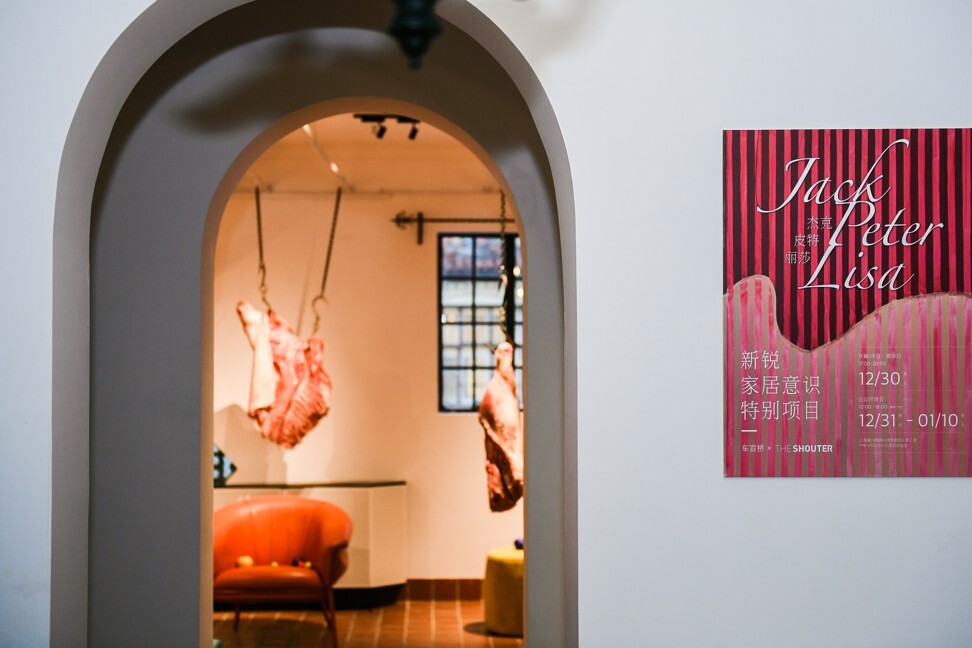
Chinese furniture heiress Che Xuanqiao on art space she founded to show her growing collection
- Canada-educated businesswoman with a passion for art showed her creative side with an exhibition juxtaposing high-end furniture with hunks of raw pork and beef
- Her major project is an art space opening soon in Beijing’s 798 Art District to house her growing collection of experimental Chinese art
Dressed plainly in a T-shirt and wearing no make-up in a coffee shop in Beijing, 28-year-old Che Xuanqiao is as far as can be from how Netflix series Bling Empire has led us to think an heiress to a multibillion-dollar business empire should look.
Despite her understated look, Che will be getting plenty of notice as part of a coterie of Chinese millennials who are as rich as Croesus and who buy a lot of art, especially since she is opening an art space with a growing collection.
Che’s is a classic rags-to-riches story. Her father, Che Jianxing, is a former carpenter who came from a family of farmers in China’s eastern Jiangsu province. He started a furniture business three decades ago with just 600 yuan borrowed from a relative.
Today, his Red Star Macalline Group (Red Star) has become a furniture retail giant and real estate conglomerate, and he was 139th on Forbes’ China Rich List for 2020 with an estimated net worth of US$4.2 billion. (Alibaba Group, owner of the South China Morning Post, is an investor in the company.)

Xuanqiao, the younger of his two daughters, studied business and economics at York University in Toronto, Canada, and is the vice-president of one of China’s largest furniture mall operators.
Her initial interest in art came through work. In 2014, Red Star co-organised the “M Home: Living in Space” exhibition with Beijing’s Ullens Centre For Contemporary Art (UCCA), a showcase of the works of 12 Chinese and overseas artists. She was handed the project as her first work assignment after returning from Canada, and she grew to treasure her exchanges with artists.
As an arts enthusiast, I want to find better ways to stimulate artists. I also want to create an environment where artists can hold salons or exchanges
From then on, she started collecting art, she says.
Housed in a two-storey, 1,000 sq ft (93 square metre) building in Beijing’s 798 Art District, it was going to be launched in 2020, but its opening was postponed with the outbreak of Covid-19. Che says the venture is part of the corporate social responsibility work of Red Star, and that it will now open in the summer.

A virtual opening took place last month to showcase videos and other forms of digital art. Unusually, the non-profit art space is making those works freely available online, including five short videos that it commissioned artist Tao Hui to create.
The series, called Similar Disguise, explores the fragmentation of the media landscape in today’s social-media-crazed world, curator and artistic director Yuan Fuca says.
Another major work commissioned for the show is Human Dust by Chen Tianzhuo, a 10-minute video about life and death that has a lot of footage related to Tibetan Buddhism and no human presence. As is often the case with Chen’s cross-media projects, the video is going to be followed by a live performance with installation art, Yuan says.

The centre publishes a weekly, bilingual online art magazine called Heichi, and has an agreement with the US-based e-flux art journal to publish its articles in Chinese.
The magazine features art criticism and essays from curators, scholars and artists. It aims to provide alternative perspectives on art’s relationship to politics, society, spirituality, and technology.
Che says the art centre is a serious venture and not mere corporate window-dressing. “As an arts enthusiast, I want to find better ways to stimulate artists. I also want to create an environment where artists can hold salons or exchanges. I don’t want the art centre to be just some associate venture of a real estate project,” she says.

Che is keen to explore her own creative impulses while juggling her corporate responsibilities as a senior executive at Red Star and her own high-end furniture brand, The Shouter. She has no art training, but she dabbles in designing furniture and jewellery, and made a six-minute video called Earth in 2019 that shows clods of earth dug up near the company’s workshop being pulverised into a fine powder.
This month, she oversaw The Shouter’s “Jack Peter Lisa” – part art show, part furniture display – where chairs and sofas were shown with large strips of raw pork and beef hanging beside them in a century-old villa called The Cloister on Fuxing Road in Shanghai.
Che says she got the inspiration for the juxtaposition of the meat and furniture on a trip to Italy two years ago.

“In Italy, I saw a man wearing a pair of well-polished leather shoes and his big pet dog ran up to him. Its shining fur and the fine leather made for a beautiful picture. [Like fur], meat is related to the body. Furniture creates spaces that are also related to the body. So I made the installations. Coupled with the historical building, the visual effects are powerful,” she says.
Che says she has no wish to pursue the glitzy lifestyle of other wealthy offspring of Chinese entrepreneurs. She says her parents have instilled in her a wish to pursue “meaningful ventures” and to make friends with those more brilliant than she is. She is well aware of how privileged she is.
“I see art as the most interesting thing and I feel lucky that I can pursue it,” she adds.

